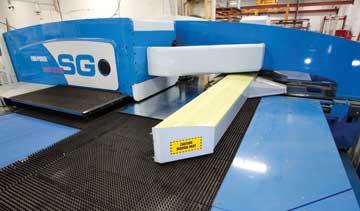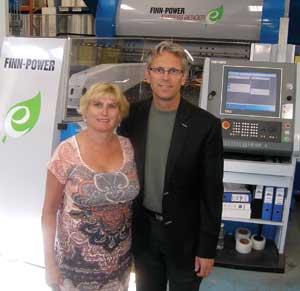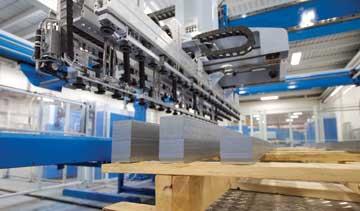- FMA
- The Fabricator
- FABTECH
- Canadian Metalworking
World-class fabricating
Leading edge technology gives Alberta fabricator competitive leg up
- June 10, 2011
- News Release
- Fabricating
Ingenuity, opportunity and the ability to see beyond manufacturing restrictions has made Ray Turner and his Edmonton, AB, company, Lenmak Exterior Innovations Inc., a success story.
Turner is a humble visionary who used his knowledge of equipment and his keen sense of research to turn his small shop into a world-class facility. In fact, he invested in a flexible manufacturing system (FMS) made by Prima Power (formerly Prima Finn-Power) and applied it to making exterior building components.
“I don’t think anyone else anywhere is doing what I’m doing,” says Turner. “I’m using precision equipment and using it in a non-precision environment.”
The installation of Prima Power’s Punch, Shear and Bend Flexible Manufacturing Cell has given the company a competitive edge with the potential to double earnings over the last three years.
Of course; getting to this point didn’t happen overnight.
Thirteen years ago, Turner was a salesman for a residential exterior wholesale distributor, when he recognized an opportunity that turned into a full-fledged business. “We were selling maintenance-free vinyl windows but there was no way to dress up or add character to the windows without adding maintenance to them,” he says. “I gave it some thought and came up with a prefinished aluminum window batten that added colour and character without compromising its maintenance-free quality.”
He opened a small shop and started to produce decorative accessories for residential exteriors including linear channels, aluminum shutters and octagon louvers. He had already built a good client base from his former competitors in the residential exterior building business and had a successful start.
Soon after he started his business he attended a metalworking show in Atlanta and began to research equipment. When he returned, he went to his wife Lori (the other part of this successful venture), and asked her if they could remortgage the house to buy a 10 ft folder and a 10 ft shear. She agreed. “Everything took off after that,” he says. “We added more equipment and the business expanded to other markets. I was bending pre-finished steel trims for flat roofers, agriculture and standing seam buildings.”
In 2004, Lenmak progressed to vertical integration and moved to master coils giving the small but evolving company a lot more flexibility. It also implemented Lean Manufacturing which led to greater company structure. “We learned the power of reducing non-value added activity and how to pull production rather than push.”
Prima Power
The company continued to grow. It was producing a very good and substantial product line but Turner had an idea that kept floating around in his mind. “I always wanted to take the FMS concept and see if I could adapt it to manufacture multiple side exterior panels.”
Over the years, he had contact with Prima Power’s sales rep who shared information about their products to Turner. He also continued his research; talked to people in the business, and travelled to metalworking shows around the world. When the opportunity came his way, he visited other manufacturing facilities where the equipment was being used. “I talked to people from all over the world who were using the Prima Power equipment and even hung around Prima Power’s booth for days at one conference. I did whatever I could to educate myself about the equipment.”
Then, in January 2009, just when the recession hit, the opportunity presented itself. Even though the company’s sales dropped by 35 per cent and the Canadian dollar started to creep up, Turner kept his eyes on the prize. “Sales for machines world wide were declining because of the recession. There was an opportunity there and I took it,” says Turner.
He went to Lori for guidance. She agreed to buy the equipment but with one stipulation. “She wanted to stay in the same location and I knew that would be difficult considering the space restrictions we had.”
Prima Power had a solution to his space problem. They told him about a 90˚ line they created for a company in Italy for making pizza ovens that might work in his facility. It did.
Today the company is using Prima Power’s Punch, Shear and Bend Flexible Manufacturing Cell, which includes the Shear Genius (SG) punch/shear combination (model SG6: 3,074 mm x 1,565 mm (120 in. x 60 in.) and the EBe automated bender.
Shear Genius flexibility
The SG integrated punch shear combination machine transforms a full-sized sheet into punched parts. These parts can be moved to secondary operations using sorting and stacking automation and then on to bending operations without being touched by human hands.
Mike Stock, vice president and bending products manager for Prima Power North America Inc., says the combination delivers finished parts with a dramatic reduction in scrap and manual labour along with increased profitability.
The SG also eliminates wasteful skeletons and costly secondary operations such as deburring. It allows the automated process to begin with a full-sized sheet of material and end with a punched part after automated loading, punching, forming, shearing, stacking and unloading — all in one operation. “This allows true single-piece flow to be synchronized with a customer’s takt time,” says Stock.
The Sorting and Stacking Robot automatically unloads the parts from the SG and loads the parts to the Express Bender (model EBe5) automated bender. “The EBe is designed specifically for each fabricator’s production requirements to achieve maximum productivity, quality, and repeatability,” says Stock.
The bending operation is fully automated, from the loading of flat punched parts to unloading of the finished product. It has a maximum bending length of 2550 mm (100.39 in.) and a maximum opening height of 200 mm (8 in.). The new construction features actuations of the bending blade movements (vertical and horizontal) by NC servo axes instead of hydraulic cylinders. The upper tool movements are also made by another NC servo axis.
A manufacturing marriage
The automated system married well with Lenmak’s previous business and Turner was able to continue working with master coils without losing on his investment. “We cut all of our sheet, which the new system required.”
Lenmak is making a distinct product with the Prima Power manufacturing cell: decorative exterior panels (up to 42 x 96 in./1066 x 2438 mm). “I created my own market for the panels just by looking at my existing equipment and seeing if it could make something I hadn’t thought it could.”
The line has certainly changed the manufacturing process. “We do it from start to finish; from cutting the sheets to bending the final pieces,” he says. “A job that used to take 20 minutes, now takes a fraction of the time.”
But the benefits don’t stop there. He says part quality, along with increased production and flexibility is due to Prima Power SG and EB technology. There’s been elimination of labour costs due to automation and improved operator safety due to the structural integrity of the line, which removes the operator from the process area.
There is also a tremendous value to the customer with delivery times drastically cut. “What used to take six to eight weeks to deliver now takes one to two,” Turner says.
LEEDing the way
Turner also saw the advantages of Lenmak earning Leadership in Energy and Environmental Design (LEED) credits from his new line. Something Turner sees as a marketable advantage. (LEED sets new parameters to develop sustainable and environment friendly buildings.)
“This is becoming a significant issue in the building materials business,” Turner says. “Buildings provide 48 per cent of the carbon worldwide and the construction industry is under pressure to produce sustainable buildings.”
The challenge is to produce structures with the least amount of carbon footprint during and after construction. “The more commodity items or items that are bulky or awkward that are made in a facility of where a building is being built, bring in more LEED credits. We should be looking at this as a marketable edge.”
Competing with China
Turner believes if Canadian manufacturers tool up and offer world-class in manufacturing capabilities and equipment, they can compete, and they can look after their own needs. “We can potentially make better products and move them to other parts of the world.”
He believes efficiency equals pricing and manufacturers should buy good equipment and be efficient and let the price look after itself. “Prima Power is an excellent example of the quality equipment I’m referring to.”
Future friendly
Turner sees a bright future for Lenmak. “I will survive. I’m out in front and will always buy top-of-the-line. I see a new custom building in our future with more capacity and we will gain more LEED credits as we more foreword.”
Turner’s advice to Canadian manufacturers is simply this. “All you have to do to compete is buy quality equipment and believe in yourself,” he says. “Labour will become less of an issue when more automation is used. To keep just-in-time delivery, invest in as much automation as you can and you will compete and win.”CM
Patty Jessome is a freelance writer based in Edmonton, AB.
subscribe now


Keep up to date with the latest news, events, and technology for all things metal from our pair of monthly magazines written specifically for Canadian manufacturers!
Start Your Free Subscription- Trending Articles
Aluminum MIG welding wire upgraded with a proprietary and patented surface treatment technology

CWB Group launches full-cycle assessment and training program
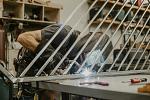
Achieving success with mechanized plasma cutting
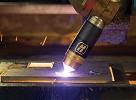
Hypertherm Associates partners with Rapyuta Robotics

Brushless copper tubing cutter adjusts to ODs up to 2-1/8 in.
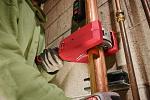
- Industry Events
MME Winnipeg
- April 30, 2024
- Winnipeg, ON Canada
CTMA Economic Uncertainty: Helping You Navigate Windsor Seminar
- April 30, 2024
- Windsor, ON Canada
CTMA Economic Uncertainty: Helping You Navigate Kitchener Seminar
- May 2, 2024
- Kitchener, ON Canada
Automate 2024
- May 6 - 9, 2024
- Chicago, IL
ANCA Open House
- May 7 - 8, 2024
- Wixom, MI













